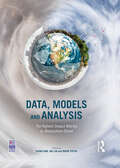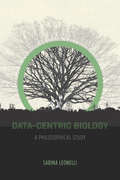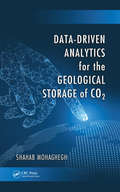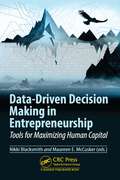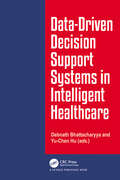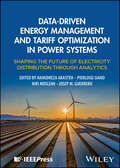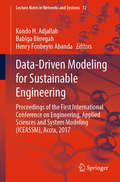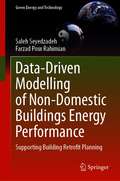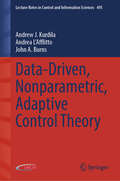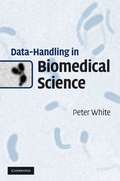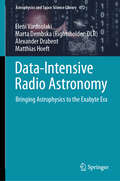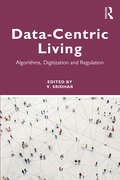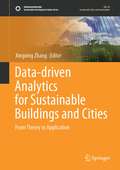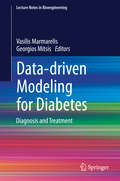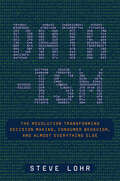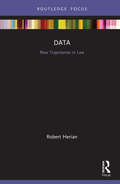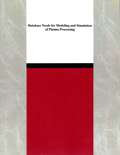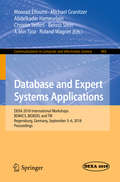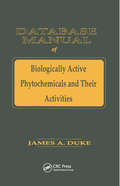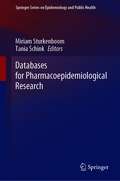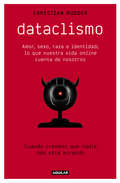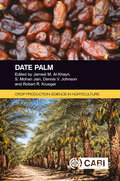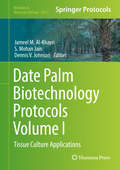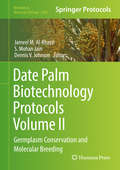- Table View
- List View
Data, Models and Analysis: The Highest Impact Articles in 'Atmosphere-Ocean'
by Guoqi Han, Hai Lin and Douw SteynThis volume contains the ten most cited articles that have appeared in the journal Atmosphere-Ocean since 1995. These articles cover a wide range of topics in meteorology, climatology and oceanography. Modelling work is represented in five papers, covering global climate model development; a cumulus parameterization scheme for global climate models; development of a regional forecast modelling system and parameterization of peatland hydraulic processes for climate models. Data rehabilitation and compilation in order to support trend analysis work on comprehensive precipitation and temperature data sets is presented in four papers. Field studies are represented by a paper on the circumpolar lead system. While the modelling studies are global in their application and applicability, the data analysis and field study papers cover environments that are specifically, but not uniquely, Canadian. This book will be of interest to researchers, students and professionals in the various sub-fields of meteorology, oceanography and climate science.
Data-Centric Biology: A Philosophical Study
by Sabina LeonelliIn recent decades, there has been a major shift in the way researchers process and understand scientific data. Digital access to data has revolutionized ways of doing science in the biological and biomedical fields, leading to a data-intensive approach to research that uses innovative methods to produce, store, distribute, and interpret huge amounts of data. In Data-Centric Biology, Sabina Leonelli probes the implications of these advancements and confronts the questions they pose. Are we witnessing the rise of an entirely new scientific epistemology? If so, how does that alter the way we study and understand life—including ourselves? Leonelli is the first scholar to use a study of contemporary data-intensive science to provide a philosophical analysis of the epistemology of data. In analyzing the rise, internal dynamics, and potential impact of data-centric biology, she draws on scholarship across diverse fields of science and the humanities—as well as her own original empirical material—to pinpoint the conditions under which digitally available data can further our understanding of life. Bridging the divide between historians, sociologists, and philosophers of science, Data-Centric Biology offers a nuanced account of an issue that is of fundamental importance to our understanding of contemporary scientific practices.
Data-Driven Analytics for the Geological Storage of CO2
by Shahab MohagheghData-driven analytics is enjoying unprecedented popularity among oil and gas professionals. Many reservoir engineering problems associated with geological storage of CO2 require the development of numerical reservoir simulation models. This book is the first to examine the contribution of artificial intelligence and machine learning in data-driven analytics of fluid flow in porous environments, including saline aquifers and depleted gas and oil reservoirs. Drawing from actual case studies, this book demonstrates how smart proxy models can be developed for complex numerical reservoir simulation models. Smart proxy incorporates pattern recognition capabilities of artificial intelligence and machine learning to build smart models that learn the intricacies of physical, mechanical and chemical interactions using precise numerical simulations. This ground breaking technology makes it possible and practical to use high fidelity, complex numerical reservoir simulation models in the design, analysis and optimization of carbon storage in geological formations projects.
Data-Driven Decision Making in Entrepreneurship: Tools for Maximizing Human Capital
by Nikki Blacksmith Maureen E. McCuskerSince the beginning of the 21st century, there has been an explosion in startup organizations. Together, these organizations have been valued at over $3 trillion. In 2019, alone, nearly $300 billion of venture capital was invested globally (Global Startup Ecosystem Report 2020). Simultaneously, an explosion in high volume and high velocity of big data is rapidly changing how organizations function. Gone are the days where organizations can make decisions solely on intuition, logic, or experience. Some have gone as far as to say that data is the most valuable currency and resource available to businesses, and startups are no exception. However, startups and small businesses do differ from their larger counterparts and corporations in three distinct ways: 1) they tend to have fewer resources, time, and specialized training to devote to data analytics; 2) they are part of a unique entrepreneurial ecosystem with unique needs; 3) scholarship and academic research on human capital data analytics in startups is lacking. Existing entrepreneurship research focuses almost exclusively on macro-level aspects. There has been little to no integration of micro- and meso-level research (i.e., individual and team sciences), which is unfortunate given how organizational scientists have significantly advanced human capital data analytics. Unlike other books focused on data analytics and decision for organizations, this proposed book is purposefully designed to be more specifically aimed at addressing the unique idiosyncrasies of the science, research, and practice of startups. Each chapter highlights a specific organizational domain and discuss how a novel data analytic technique can help enhance decision-making, provides a tutorial of said regarding the data analytic technique, and lists references and resources for the respective data analytic technique. The volume will be grounded in sound theory and practice of organizational psychology, entrepreneurship and management and is divided into two parts: assessing and evaluating human capital performance and the use of data analytics to manage human capital.
Data-Driven Decision Support System in Intelligent HealthCare
by Yu-Chen Hu Debnath BhattacharyyaMachine Intelligence with Generative AI is one of the most trending topics with applications in almost all fields of life. In healthcare, it is not only accelerating the development of new products, but also automating the generation of new and synthetic content making it easier to train and improve machine learning models.Some of the biggest achievements of Generative AI in healthcare have been drug discovery, personalized care, differentially private synthetic data generation, operational efficiency, and many more. Generative AI models like Generative Adversarial Networks, and Variational Autoencoders are employed to generate synthetic medical images, aiding in data augmentation, facilitating disease diagnosis, and enabling advanced medical imaging research. Additionally, Generative AI techniques are being utilized for creating realistic electronic health records (EHRs) and simulated patient data, supporting privacy-preserving data sharing, and empowering innovative studies for personalized medicine and drug development. NLP models like ClinicalBERT use transformer-based deep learning architecture to understand and represent contextual information in large clinical text datasets, such as electronic health records (EHRs) and medical literature, and can better grasp medical terminologies, domain-specific language, and contextual nuances that are unique to the healthcare field.This volume delves into the realm of Machine Intelligence with Generative AI and explores its impact on the healthcare industry.
Data-Driven Energy Management and Tariff Optimization in Power Systems: Shaping the Future of Electricity Distribution through Analytics
by Pierluigi Siano Josep M. Guerrero Hamidreza Arasteh Niki MoslemiPresents a comprehensive guide to transforming power systems through data Data-Driven Energy Management and Tariff Optimization in Power Systems offers an authoritative examination of how data science is reshaping the energy landscape. As the electricity sector grapples with increasing complexity, this timely volume responds to a growing demand for adaptive strategies that enable accurate forecasting, intelligent tariff design, and optimized resource allocation, underpinned by advanced analytics and machine learning. Drawing on global expertise and real-world case studies, the book bridges the theoretical and practical dimensions of energy systems management, providing deep insight into how data collected from smart meters, SCADA systems, and IoT devices can be mined for predictive modeling, demand response, and peak load management. The book’s accessible structure and didactic approach make it suitable for a wide readership, while its breadth of topics ensures relevance across the spectrum of energy challenges. Integrating rigorous analysis with application-oriented strategies, this book: Presents advanced techniques in machine learning, predictive modeling, and pattern recognition tailored to energy management and tariff designProvides accessible explanations of complex algorithms through a didactic and visual teaching style, including informative tables and illustrationsHighlights tools for grid stability, demand forecasting, and peak load management using high-resolution energy dataAddresses the integration of renewable energy sources into existing infrastructures through data-driven optimization Designed for a broad audience, Data-Driven Energy Management and Tariff Optimization in Power Systems is ideal for upper-level undergraduate and graduate courses in energy management, power systems analytics, and smart grids as part of electrical engineering or energy policy programs. It is also an essential reference for power system engineers, energy analysts, researchers, and policymakers involved in grid planning and optimization.
Data-Driven Modeling for Sustainable Engineering: Proceedings of the First International Conference on Engineering, Applied Sciences and System Modeling (ICEASSM), Accra, 2017 (Lecture Notes in Networks and Systems #72)
by Kondo H. Adjallah Babiga Birregah Henry Fonbeyin AbandaThis book gathers the proceedings of the 1st International Conference on Engineering, Applied Sciences and System Modeling (ICEASSM), a four-day event (18th–21st April 2017) held in Accra, Ghana. It focuses on research work promoting a better understanding of engineering problems through applied sciences and modeling, and on solutions generated in an African setting but with relevance to the world as a whole. The book provides a holistic overview of challenges facing Africa, and addresses various areas from research and development perspectives. Presenting contributions by scientists, engineers and experts hailing from a host of international institutions, the book offers original approaches and technological solutions to help solve real-world problems through research and knowledge sharing. Further, it explores promising opportunities for collaborative research on issues of scientific, economic and social development, making it of interest to researchers, scientists and practitioners looking to conduct research in disciplines such as water supply, control, civil engineering, statistical modeling, renewable energy and sustainable urban development.
Data-Driven Modelling of Non-Domestic Buildings Energy Performance: Supporting Building Retrofit Planning (Green Energy and Technology)
by Saleh Seyedzadeh Farzad Pour RahimianThis book outlines the data-driven modelling of building energy performance to support retrofit decision-making. It explains how to determine the appropriate machine learning (ML) model, explores the selection and expansion of a reasonable dataset and discusses the extraction of relevant features and maximisation of model accuracy. This book develops a framework for the quick selection of a ML model based on the data and application. It also proposes a method for optimising ML models for forecasting buildings energy loads by employing multi-objective optimisation with evolutionary algorithms. The book then develops an energy performance prediction model for non-domestic buildings using ML techniques, as well as utilising a case study to lay out the process of model development. Finally, the book outlines a framework to choose suitable artificial intelligence methods for modelling building energy performances. This book is of use to both academics and practising energy engineers, as it provides theoretical and practical advice relating to data-driven modelling for energy retrofitting of non-domestic buildings.
Data-Driven, Nonparametric, Adaptive Control Theory (Lecture Notes in Control and Information Sciences #495)
by Andrew J. Kurdila Andrea L'Afflitto John A. BurnsData-Driven, Nonparametric, Adaptive Control Theory introduces a novel approach to the control of deterministic, nonlinear ordinary differential equations affected by uncertainties. The methods proposed enforce satisfactory trajectory tracking despite functional uncertainties in the plant model. The book employs the properties of reproducing kernel Hilbert (native) spaces to characterize both the functional space of uncertainties and the controller's performance. Classical control systems are extended to broader classes of problems and more informative characterizations of the controllers’ performances are attained. Following an examination of how backstepping control and robust control Lyapunov functions can be ported to the native setting, numerous extensions of the model reference adaptive control framework are considered. The authors’ approach breaks away from classical paradigms in which uncertain nonlinearities are parameterized using a regressor vector provided a priori or reconstructed online. The problem of distributing the kernel functions that characterize the native space is addressed at length by employing data-driven methods in deterministic and stochastic settings. The first part of this book is a self-contained resource, systematically presenting elements of real analysis, functional analysis, and native space theory. The second part is an exposition of the theory of nonparametric control systems design. The text may be used as a self-study book for researchers and practitioners and as a reference for graduate courses in advanced control systems design. MATLAB® codes, available on the authors’ website, and suggestions for homework assignments help readers appreciate the implementation of the theoretical results.
Data-Handling in Biomedical Science
by Peter WhitePacked with worked examples and problems, this book will help the reader improve their confidence and skill in data-handling. The mathematical methods needed for problem-solving are described in the first part of the book, with chapters covering topics such as indices, graphs and logarithms. The following eight chapters explore data-handling in different areas of microbiology and biochemistry including microbial growth, enzymes and radioactivity. Each chapter is fully illustrated with worked examples that provide a step-by-step guide to the solution of the most common problems. Over 30 exercises, ranging in difficulty and length, allow you to practise your skills and are accompanied by a full set of hints and solutions.
Data-Intensive Radio Astronomy: Bringing Astrophysics to the Exabyte Era (Astrophysics and Space Science Library #472)
by Eleni Vardoulaki Marta Dembska Alexander Drabent Matthias HoeftRadio astronomy is irreversibly moving towards the exabyte era. In the advent of all-sky radio observations, efficient tools and methods to manage the large data volume generated have become imperative. This book brings together the knowledge of several different research fields to present an overview of current state-of-the-art methods in data-intensive radio astronomy. Its approach is comprehensive and data-centric, offering a coherent look at the four distinct parts of the data lifecycle: Data creation, storage and archivesData processingPost-processing and data analysisData access and reuse Large data management has been the topic of discussion within the astronomical community for decades. Some relevant areas explored in this volume are: ongoing technological innovations in interferometers and computing facilities; difficulties and possible solutions for the huge processing demands of radio telescope projects such as LOFAR, MeerKat, ASKAP; concepts for reliable and fast storage for archiving; and more. Written by experts across astrophysics, high-energy particle physics, data science, and computer science, this volume will help researchers and advanced students better understand the current state of data-intensive radio astronomy and tackle the major problems that may arise from future instruments.
Data-centric Living: Algorithms, Digitization and Regulation
by Sridhar V.This book explores how data about our everyday online behaviour are collected and how they are processed in various ways by algorithms powered by Artificial Intelligence (AI) and Machine Learning (ML). The book investigates the socioeconomic effects of these technologies, and the evolving regulatory landscape that is aiming to nurture the positive effects of these technology evolutions while at the same time curbing possible negative practices. The volume scrutinizes growing concerns on how algorithmic decisions can sometimes be biased and discriminative; how autonomous systems can possibly disrupt and impact the labour markets, resulting in job losses in several traditional sectors while creating unprecedented opportunities in others; the rapid evolution of social media that can be addictive at times resulting in associated mental health issues; and the way digital Identities are evolving around the world and their impact on provisioning of government services. The book also provides an in-depth understanding of regulations around the world to protect privacy of data subjects in the online world; a glimpse of how data is used as a digital public good in combating Covid pandemic; and how ethical standards in autonomous systems are evolving in the digital world. A timely intervention in this fast-evolving field, this book will be useful for scholars and researchers of digital humanities, business and management, internet studies, data sciences, political studies, urban sociology, law, media and cultural studies, sociology, cultural anthropology, and science and technology studies. It will also be of immense interest to the general readers seeking insights on daily digital lives.
Data-driven Analytics for Sustainable Buildings and Cities: From Theory to Application (Sustainable Development Goals Series)
by Xingxing ZhangThis book explores the interdisciplinary and transdisciplinary fields of energy systems, occupant behavior, thermal comfort, air quality and economic modelling across levels of building, communities and cities, through various data analytical approaches. It highlights the complex interplay of heating/cooling, ventilation and power systems in different processes, such as design, renovation and operation, for buildings, communities and cities. Methods from classical statistics, machine learning and artificial intelligence are applied into analyses for different building/urban components and systems. Knowledge from this book assists to accelerate sustainability of the society, which would contribute to a prospective improvement through data analysis in the liveability of both built and urban environment. This book targets a broad readership with specific experience and knowledge in data analysis, energy system, built environment and urban planning. As such, it appeals to researchers, graduate students, data scientists, engineers, consultants, urban scientists, investors and policymakers, with interests in energy flexibility, building/city resilience and climate neutrality.
Data-driven Modeling for Diabetes: Diagnosis and Treatment (Lecture Notes in Bioengineering)
by Vasilis Marmarelis Georgios MitsisThis contributed volume presents computational models of diabetes that quantify the dynamic interrelationships among key physiological variables implicated in the underlying physiology under a variety of metabolic and behavioral conditions. These variables comprise for example blood glucose concentration and various hormones such as insulin, glucagon, epinephrine, norepinephrine as well as cortisol. The presented models provide a powerful diagnostic tool but may also enable treatment via long-term glucose regulation in diabetics through closed-look model-reference control using frequent insulin infusions, which are administered by implanted programmable micro-pumps. This research volume aims at presenting state-of-the-art research on this subject and demonstrating the potential applications of modeling to the diagnosis and treatment of diabetes. The target audience primarily comprises research and experts in the field but the book may also be beneficial for graduate students.
Data-ism: The Revolution Transforming Decision Making, Consumer Behavior, and Almost Everything Else
by Steve Lohr“Lohr uses his Pulitzer Prize-winning reporting skills to dig into and explain the power, pervasiveness, and potential downside of big data.” —Library JournalIn Data-ism, New York Times reporter Steve Lohr explains how big-data technology is ushering in a revolution in proportions that promise to be the basis of the next wave of efficiency and innovation across the economy. But more is at work here than technology. Big data is also the vehicle for a point of view, or philosophy, about how decisions will be—and perhaps should be—made in the future. Lohr investigates the benefits of data while also examining its dark side.Data-ism is about this next phase, in which vast Internet-scale data sets are used for discovery and prediction in virtually every field. It shows how this new revolution will change decision making—by relying more on data and analysis, and less on intuition and experience—and transform the nature of leadership and management. Focusing on young entrepreneurs at the forefront of data science as well as on giant companies such as IBM that are making big bets on data science for the future of their businesses, Data-ism is a field guide to what is ahead, explaining how individuals and institutions will need to exploit, protect, and manage data to stay competitive in the coming years. With rich examples of how the rise of big data is affecting everyday life, Data-ism also raises provocative questions about policy and practice that have wide implications for everyone.The age of data-ism is here. But are we ready to handle its consequences, good and bad?
Data: New Trajectories in Law (New Trajectories in Law)
by Robert HerianThis book explores the phenomenon of data – big and small – in the contemporary digital, informatic and legal-bureaucratic context. Challenging the way in which legal interest in data has focused on rights and privacy concerns, this book examines the contestable, multivocal and multifaceted figure of the contemporary data subject. The book analyses "data" and "personal data" as contemporary phenomena, addressing the data realms, such as stores, institutions, systems and networks, out of which they emerge. It interrogates the role of law, regulation and governance in structuring both formal and informal definitions of the data subject, and disciplining data subjects through compliance with normative standards of conduct. Focusing on the ‘personal’ in and of data, the book pursues a re-evaluation of the nature, role and place of the data subject qua legal subject in on and offline societies: one that does not begin and end with the inviolability of individual rights but returns to more fundamental legal principles suited to considerations of personhood, such as stewardship, trust, property and contract. The book’s concern with the production, use, abuse and alienation of personal data within the context of contemporary communicative capitalism will appeal to scholars and students of law, science and technology studies, and sociology; as well as those with broader political interests in this area.
Database Needs for Modeling and Simulation of Plasma Processing
by Panel on Database Needs in Plasma ProcessingInformation on Database Needs for Modeling and Simulation of Plasma Processing
Database and Expert Systems Applications: DEXA 2018 International Workshops, BDMICS, BIOKDD, and TIR, Regensburg, Germany, September 3–6, 2018, Proceedings (Communications in Computer and Information Science #903)
by Mourad Elloumi Abdelkader Hameurlain Roland Wagner A Min Tjoa Michael Granitzer Christin Seifert Benno SteinThis volume constitutes the refereed proceedings of the three workshops held at the 29th International Conference on Database and Expert Systems Applications, DEXA 2018, held in Regensburg, Germany, in September 2018: the Third International Workshop on Big Data Management in Cloud Systems, BDMICS 2018, the 9th International Workshop on Biological Knowledge Discovery from Data, BIOKDD, and the 15th International Workshop on Technologies for Information Retrieval, TIR.The 25 revised full papers were carefully reviewed and selected from 33 submissions. The papers discuss a range of topics including: parallel data management systems, consistency and privacy cloud computing and graph queries, web and domain corpora, NLP applications, social media and personalization
Database of Biologically Active Phytochemicals & Their Activity
by James A. DukeDatabase of Biologically Active Phytochemicals and Their Activities presents an alphabetical tabulation of some 3,000 biologically active phytochemicals (elements and compounds) from higher plants. The data includes at least one and in some cases as many as 25 biological activities for each phytochemical. The database also provides data on effective dose, inhibitory concentrations, and lethal and/or toxic doses. Entries after 1990 indicate the source of the data. Database of Biologically Active Phytochemicals and Their Activities makes it possible to locate the concentration of many compounds in plants and compare this data with dosage information to calculate how much of a given plant food it would take to cause lethality, antioxidant activity, hypoglycemic activity, or artemicidal activity. Using WordPerfect (TM) 5.1's search function, you can find compounds by entering a key word in their name (e.g., choline or salicyl-), locate all compounds with a given activity (e.g., hypotensive), or list all compounds for which ED50 data is entered or reported.
Database of Dreams
by Rebecca LemovJust a few years before the dawn of the digital age, Harvard psychologist Bert Kaplan set out to build the largest database of sociological information ever assembled. It was the mid-1950s, and social scientists were entranced by the human insights promised by Rorschach tests and other innovative scientific protocols. Kaplan, along with anthropologist A. I. Hallowell and a team of researchers, sought out a varied range of non-European subjects among remote and largely non-literate peoples around the globe. Recording their dreams, stories, and innermost thoughts in a vast database, Kaplan envisioned future researchers accessing the data through the cutting-edge Readex machine. Almost immediately, however, technological developments and the obsolescence of the theoretical framework rendered the project irrelevant, and eventually it was forgotten.
Databases for Pharmacoepidemiological Research (Springer Series on Epidemiology and Public Health)
by Miriam Sturkenboom Tania SchinkThis book allows readers to gain an in-depth understanding of the role of real-world data in pharmacoepidemiology, and highlights the strengths and limitations of the respective databases with regard to pharmacoepidemiological research. Over the past decade, the increasing use of real-world data in pharmacoepidemiological research has been accompanied by a growing recognition of the value of real-world evidence in clinical and regulatory decision-making. Electronic healthcare databases allow analyses of drug and vaccine utilization in routine care after approval, as well as investigations of their comparative effectiveness and safety. They are especially useful for the identification of rare risks and rare drug exposures over long periods of time, and as such sustainably extend the basis for drug safety research. This book provides an introduction to the role of real-world data in pharmacoepidemiological research and the main developments in the last 15 years. It also offers a comprehensive overview of the general classification characteristics of databases, together with their strengths and limitations, and a detailed description of 21 individual databases, written by professionals who work with or maintain them.
Dataclismo: Amor, sexo, raza e identidad; lo que nuestra vida online cuenta de nosotros
by Christian Rudder¿Has pensado alguna vez las consecuencias de colgar tu intimidad en las redes sociales? Dataclismo es una investigación audaz e irreverente sobre el comportamiento humano; un nuevo enfoque a una revolución en marcha. Durante décadas las únicas herramientas para estudiar el comportamiento humano partían de encuestas o pequeños experimentos. Hoy es posible un nuevo enfoque. Debido a Internet cada vez mostramos más aspectos de nuestra vida y los investigadores pueden observar nuestro comportamiento directamente, extrapolando a grandes cifras y sin filtros. Los analistas son a día de hoy los nuevos sociólogos. En Dataclismo Christian Rudder nos explica de forma original cómo a través de los likes de Facebook se puede predecir con precisión de cirujano la orientación sexual de una persona e incluso su inteligencia, cómo las mujeres atractivas reciben más solicitudes de entrevistas; y por qué hay que tener haters para estar de moda. Muestra cómo se expresa la gente en público y en privado y otras muchas cosas más. Dataclismo es una nueva forma de vernos a nosotros mismos, un libro de alquimia en el que las matemáticas se humanizan y los números se convierten en los trovadores de nuestro tiempo. Bestseller en The New York Times La crítica ha dicho...«Rudder nos demuestra que la información que proporcionamos a título individual dice mucho sobre quiénes somos como colectivo. Una lectura que es visualmente cautivadora y un tema fascinante hacen de este libro una elección ideal.»Library Journal «Demógrafos, emprendedores, estudiantes de historia y sociología y ciudadanos de a pie por igual encontrarán multitud de provocaciones y, sí, muchos datos en las páginas de este libro.»Kirkus «Estudiar la conducta humana es como explorar una jungla: es trabajoso y lioso, y uno se pierde con facilidad. Pero Christian Rudder es un guía experto que nos desvela verdades fundamentales sobre quiénes somos.»Dan Ariely, autor de Predictably Irrational «Dataclismo es un libro repleto de secretos suculentos: secretos sobre a quién amamos, lo que anhelamos, por qué nos gusta lo que nos gusta y cómo nos hacemos cambiar de opinión y de vida unos a otros muchas veces sin siquiera saberlo.»Jane McGonigal, autora de Reality is Broken «Una mirada fascinante, casi voyeurística, sobre quiénes somos en realidad.»Steven Strogatz, profesor en la universidad de Cornell y autor de The Joy of X «Un libro divertido y profundo sobre temas importantes. La raza, el amor, el sexo... ¿Somos la suma de los datos que generamos? Lee este libro de inmediato y verás si eres capaz de responder a esa pregunta.»Errol Morris
Date Palm (Crop Production Science in Horticulture)
by Mostafa I. Waly Dr Rashid Al-Yahyai Dr Larbi Abahmane Dr Mohamed Ait-El-Mokhtar Dr Fatima-Zahra Akensous Dr M. Tahir Akram Dr Salah Mohammed Aleid Dr Melkamu Alemayehu Dr Abda Ali Dr Latifa Al-Kharusi Professor Jameel M Al-Khayri Dr Mohammed Al-Mahish Dr Abdulrasoul Mosa Al-Omran Dr Lyutha Al-Subhi Asunción Amorós Dr Mohamed Anli Dr Mohamed Marouf Aribi Dr Raja Ben-Laoaune Dr Houda Besser Dr Neeru Bhatt Dr Abderrahim Boutasknit Dr Roshini Brizmohun Dr Latifa Dhaouadi Dr Gisela Díaz Dr Raga Elzaki Dr Abdessamad Fakhech Dr Mohamed Abusaa Fennir Dr Ibrahim E. Greiby Dr Ayah R. Hilles Professor Shri Mohan Jain Rhonda Janke Dr Muhammad Jafar Jaskani Professor Dennis V Johnson Dr Imran Ul Khan Dr M Mumtaz Khan Dr Rashad Rasool Khan Dr Robert R Krueger Dr Mithlesh Kumar Dr Abdelilah Meddich Dr C. M. Muralidharan Dr Summar Abbas Naqvi Dr Taseer Abbas Naqvi Dr Concepción Obón Dr Redouane Ouhaddou Dr Ozcan Ozturk Dr Ouissame Raho Dr Diego Rivera Dr Ricardo Salomón-Torres Dr Kapil Mohan Sharma Dr Muhammad Waseem Dr Glenn C. WrightDate palm (Phoenix dactylifera L.) is a tree belonging to the palm family (Arecaceae) and is cultivated for its sweet edible fruits. Over the past century, it has become a major commercial fruit crop and a key component of agricultural production in the world's subtropical arid and semiarid regions. A crop suited both to the low-input small-farmer and the modern high-input commercial plantation, the date palm provides a livelihood for millions of people living in marginal land areas where farming options are restricted. Date palm is mainly grown for its fruits, but the whole tree is utilized. Research into date palm improvement for fruit production in recent decades has brought about improved elite cultivars, stress and pathogen resistance, and enhanced postharvest technologies. These developments have led to revised recommendations for date palm producers, and increased opportunity to promote novel fruit products. This book provides: · A practical manual on modern date palm cultivation methods. · Best practice guidelines for optimal production levels of high-quality fruit. · Opportunities for more complete utilization of date palm products at both the subsistence and commercial levels of production. With contributions from leading international experts, this is a valuable resource for researchers and students in horticulture, as well as date palm growers and processors.
Date Palm Biotechnology Protocols Volume I: Tissue Culture Applications (Methods in Molecular Biology #1637)
by S. Mohan Jain Jameel M. Al-Khayri Dennis V. JohnsonThis two-volume book is a valuable resource to students, researchers, scientists, commercial producers, consultants and policymakers interested in agriculture or plant sciences particularly in date palm biotechnology. Date Palm Biotechnology Protocols, Volume 1: Tissue Culture and Applications is comprised of 27 chapters covering adventitious organogenesis, somatic embryogenesis, contamination, hyperhydricity, acclimatization, cell suspension, protoplast and bioreactors, genetic transformation secondary metabolites, and abiotic stress. Written in the highly successful Methods in Molecular Biology series format, chapters include introductions to their respective topics, lists of the necessary materials and reagents, step-by-step, readily reproducible laboratory protocols, and tips on troubleshooting and avoiding known pitfalls. Authoritative and practical, Date Palm Biotechnology Protocols, Volume 1: Tissue Culture and Applications aims to supplement the previous volume and to provide precise stepwise protocols in the field of date palm biotechnology.
Date Palm Biotechnology Protocols Volume II: Germplasm Conservation and Molecular Breeding (Methods in Molecular Biology #1638)
by S. Mohan Jain Jameel M. Al-Khayri Dennis V. JohnsonThis two-volume book is a valuable resource to students, researchers, scientists, commercial producers, consultants and policymakers interested in agriculture or plant sciences particularly in date palm biotechnology. Chapters in Date Palm Biotechnology Protocols: Volume 2: Germplasm Conservation and Molecular Breeding guides readers through methods and protocols on germplasm in vitro conservation, molecular analysis of in vitro cultures, genetic diversity, cultivar identity, gender identification, genomics, and proteomics. Written in the highly successful Methods in Molecular Biology series format, chapters include introductions to their respective topics, lists of the necessary materials and reagents, step-by-step, readily reproducible laboratory protocols, and tips on troubleshooting and avoiding known pitfalls. Authoritative and practical, Date Palm Biotechnology Protocols: Volume 2: Germplasm Conservation and Molecular Breeding aims to supplement the previous volume and to provide precise stepwise protocols in the field of date palm biotechnology.
